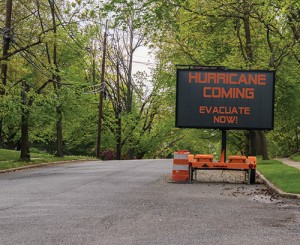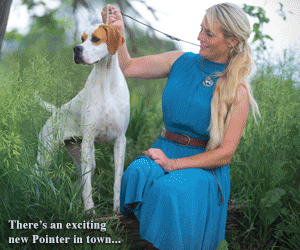Who’s Who in a Hurricane
From the archives of The Canine Chronicle
Click here to read the complete article
74 – September 2019
Extreme weather events of all kinds, from floods to fires, continue to hit every part of our country. This time of year, we are in the middle of hurricane season.
When a hurricane is first spotted, scientists, meteorologists and, of course, social media pundits, reveal their prognostications. As the storm hits, there is a voyeur’s rush to see the physical devastation. Then, we see the footage of dogs being saved or reunited with their owners by first responders and good Samaritans.
Dog breeders, owners, and handlers are often ahead of the game by reaching out to offer space and assistance to their fellow dog show folks – a pleasant reminder of the goodness in our sport.
While club and individual support is happening within the sport, the general population of dog owners show their support the best way they can. They send money. Of course, many people in the sport also send donations. In the rush, however, a large amount of hurricane-specific donation runs the risk of getting channeled elsewhere.
The shelter world may not be in our wheelhouse. For a number of practical and political reasons, though, we should know the basics of at least the largest animal organizations. We need to be informed to protect our sport and our wallets. Like replacing worn windshield wipers – we only think of it when it’s already raining. We need to know who’s who before the next disaster.
Have you ever had a friend tell you their dog has “papers” but when you ask with which organization they don’t know? There is a good reason for that; they love their pet and don’t care what it says on the papers that they can’t find anyway. Similarly, they know there is a local shelter in town but don’t know much about it. The same is true with the big three national humane and shelter organizations; they’ve heard of them but that’s about it.
Last week, I was in the checkout line at our local pet supply store and noticed a man in front of me proudly using and discussing his ASPCA credit card with the cashier. We struck up a conversation. He was a purebred standard schnauzer owner and genuinely caring soul. When I asked about his card, he told me that he supported the local “ASPCA” shelter here in town. I kindly explained that there is no real connection between our local SPCA and the ASPCA on his card. He was incredulous at first but willing to listen. In fact, after we checked out, he asked the cashier for a pen and took notes on the back of his receipt. He wanted to do the right thing but didn’t know how.
Before I continue, as I told the man in the store, I have three disclaimers. 1) My opinions are nothing more than perceptions of my research. 2) Who you donate to, or tell others to donate to, is none of my business. It’s your personal decision. 3) Not-for-profit CEO’s and Boards change, organizations change, and position statements change. Google before you give.
Over the years, several unbiased surveys have asked dog owners to identify dog organizations from a list of acronyms. Respondents are given the list of intermingling animal welfare organizations, professional organizations, and purebred dog registries. Respondents are asked what the acronyms stand for, what the group does, and if they have a favorable or unfavorable opinion of each one. No surprises, the vast majority has heard of most of the acronyms but had no idea what they did or stood for. Here’s a short sample list if you’d like to give it a try. SPCA, AHA, AKC, HSUS, AVMA, ASPCA.
In that spirit, let’s sort out a few of the major organizations, the ones the public hears about the most often.
SPCA
Most Americans have no idea what the most popular set of letters in the shelter world means. Actually, “SPCA” is just a generic term, a phrase, that’s been used in the shelter world forever. There is no national organization called the SPCA and no relationship between shelters that use SPCA in their name.
There’s nothing inherently wrong with naming a shelter using, in part, an abbreviation for the Society for the Prevention of Cruelty to Animals; for example, Southwest Michigan SPCA. It’s a simple and common way to identify a place as a shelter. Either way, lots of money is misdirected by assuming every shelter with SPCA in the name is a national organization representing all shelters.
ASPCA
The American Society for the Prevention of Cruelty to Animals (ASPCA), established in 1886, operates one shelter and it’s in New York City. It is a well-regarded shelter; however, one shelter in NYC is not what people think of when they see the letters ASPCA.
There is no question that ASPCA plays a role in disaster relief support, especially in helping shelters prepare for such disasters. They also offer grants and support to shelters nationally. However, before you donate to ASPCA or any organization, check to see if their views on dog breeding, or any of your personal beliefs, are in line with yours. There’s a chance your disaster relief donations could also be used to support issues to which you are intensely opposed.
ASPCA has a 3 out of 4 rating with Charity Navigator with a score of 97 for accountability and a 84 overall score. They are the largest fundraiser of all the organizations with last year’s donations totaling 219 million dollars. They earned Global Giving Leader Status with Charity Navigator and get high scores for transparency. But you have to know what to look for during your research.
It wasn’t that long ago that ASPCA had the son of a famous show kennel manager in charge and a senior executive who was an avid beagle field trailer and fisherman. It’s unlikely that the new management would endorse dog shows or field trials. The ASPCA is a good example of organizations that gradually change positions and shift issues.
AHA
The American Humane Association (AHA), established in 1877, is not on the front lines of television fundraising, but they have been consistently on the disaster relief front lines since World War II. They do not operate shelters, but approximately 300 shelters are AHA affiliated and agree to maintain AHA standards of care. AHA is also known for being on the sets of movies and advertisements to ensure the safety of animals used in production. Have you heard the tag line, “No animals were harmed in the making of this movie?” That’s AHA. They also work with meat and dairy farmers for animal welfare certifications, ensuring humane care of farm animals.
Most importantly, AHA is known for its Rapid Response teams that are stationed around the country to get to the front lines of disaster relief. You name the hurricane, they’ve been there. Their Red Star Animal Emergency Services program started in 1916.
AHA is at the lower end of annual donation income of the big three taking in 12 million annually. They also spend far less than ASPCA and HSUS on fundraising. They have the highest rating from Charity Navigator, 4 stars of out 4, a high score of 97 for accountability and transparency and a top score of 90.49 overall.
This not an endorsement for AHA or anyone else. Those are your decisions based on your beliefs. Comparing organizations, however, is an important step because at the end of the day, it’s all relative. AHA numbers and performance for over a century are more in line with animal welfare than animal rights. Still, I understand that some folks in the sport may have differing opinions about AHA. Again, check to see position statements and fairly weigh the good and the bad before you write the check.
By now we all know who the Humane Society of the United States (HSUS) is and what they think of dog breeders. But did you know HSUS does not operate a single animal shelter and that a fraction of 1% of their income is given directly to shelters? You have to hand it to them for coming up with a clever name, it almost sounds like a branch of the federal government. Along with having a Washington D.C. address, I’m guessing it was not by accident.
Does HSUS participate in disaster relief? I suppose that depends on how you define relief. Do some organizations use disasters as fundraising opportunities? To what extent is that a bad thing? There are no easy answers, but there are some clues.
When Hurricane Dorian recently hit the Bahamas, the main page on the HSUS website was faded into the background behind a special message about Dorian donations. The core damage from Hurricane Dorian was not in the United States so the donation link goes to HIS, Humane International Society. Interesting.
Charity Navigator gives HSUS 2 out of 4 stars. They took in 137 million dollars in donations last year. Frighteningly impressive, but still 82 million behind ASPCA. They have an overall score of 75, far behind ASPCA at 84 and AHA at 90.
AKC REUNITE
AKC Reunite is a smaller scale newcomer, a not-for-profit with its own board and CEO. It sells collar tags and registers microchips with the goal of reuniting lost pets, a serious issue in disaster situations. AKC Reunite added a disaster relief program that has donated trailers with emergency equipment to areas impacted by natural disasters. Equipment includes fans, generators, hoses, fire extinguishers, shop-vacs and pop-up tents. Donations can be made through their site at akcreunite.org.
PETA
PETA is not our friend. But you already knew that.
SUMMARY
There are many excellent and worthy local shelters that need volunteers and donations and will use them directly to help dogs. If you plan to directly donate to a shelter in a disaster affected area, make sure it really goes to that shelter. There’s a scam for every storm.
If you’re still concerned where your money will go, consider donating food and supplies instead of money. Either way, do something for the dogs. It doesn’t make you an AR extremist if you volunteer to walk a few shelter dogs or donate to disaster relief in a private way that meets your personal views. Retired handler and all-around good soul Nancy Martin does amazing work in gathering and distributing dog food to pets in Portland. She’s not the only one in the sport that has found a way to help dogs, but she sure is a good example.
The one thing everyone in the sport can agree on is that we love dogs. Ask yourself what you believe in and where you draw the line. Be informed. Know your acronyms. Don’t forget the dogs of all kinds who need help after a hurricane just because your sky may be sunny. Don’t complain about those outside the sport, educate them about how they can help dogs when a disaster strikes. Teach them about the possible perils of not knowing where their money is really going. Help in any way you can. Don’t leave it to someone else. Our nation’s dogs deserve better.
From the archives of The Canine Chronicle

Short URL: https://caninechronicle.com/?p=172349
Comments are closed













